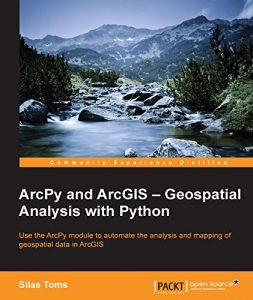About This Book
- Perform GIS analysis faster by automating tasks, such as selecting data or buffering data, by accessing GIS tools using scripting
- Access the spatial data contained within shapefiles and geodatabases, for updates, analysis and even transformation between spatial reference systems
- Produce map books and automate the mapping of geospatial analyses, reducing the time needed to produce and display the results
Who This Book Is For
If you are a GIS student or professional who needs an understanding of how to use ArcPy to reduce repetitive tasks and perform analysis faster, this book is for you. It is also a valuable book for Python programmers who want to understand how to automate geospatial analyses.
What You Will Learn
- Understand how to integrate Python into ArcGIS and make GIS analysis faster and easier
- Model an analysis and export it to Python for further improvement
- Create Python functions from exported scripts using ArcToolbox tools to avoid repetitive code
- Update the records of interest in your existing geospatial data automatically using data cursors
- Add new geospatial data to existing datasets automatically from field-collected data or data produced during analysis
- Export formatted analysis results to spreadsheets automatically
- Update map documents with analysis-generated data and export maps to PDF or image formats
- Create geometric networks and analyze routes using scripts
In Detail
ArcGIS allows for complex analyses of geographic information. The ArcPy module is used to script these ArcGIS analyses, providing a productive way to perform geo-analyses and to automate map production.
This book will guide you from basic Python scripting to advanced ArcPy script tools. This book starts off with setting up your Python environment, demonstrates a complex ArcPy script tool with multiple iterations, illustrates data access module cursors, and explains how to use ArcPy Geometry classes. Then, you will learn how to output maps using ArcPy.Mapping, and how to create ArcGIS script tools.
With the help of this book, you will be able to create repeatable analyses reducing the time-consuming nature of GIS, making you into a GIS professional as powerful as a whole team.






